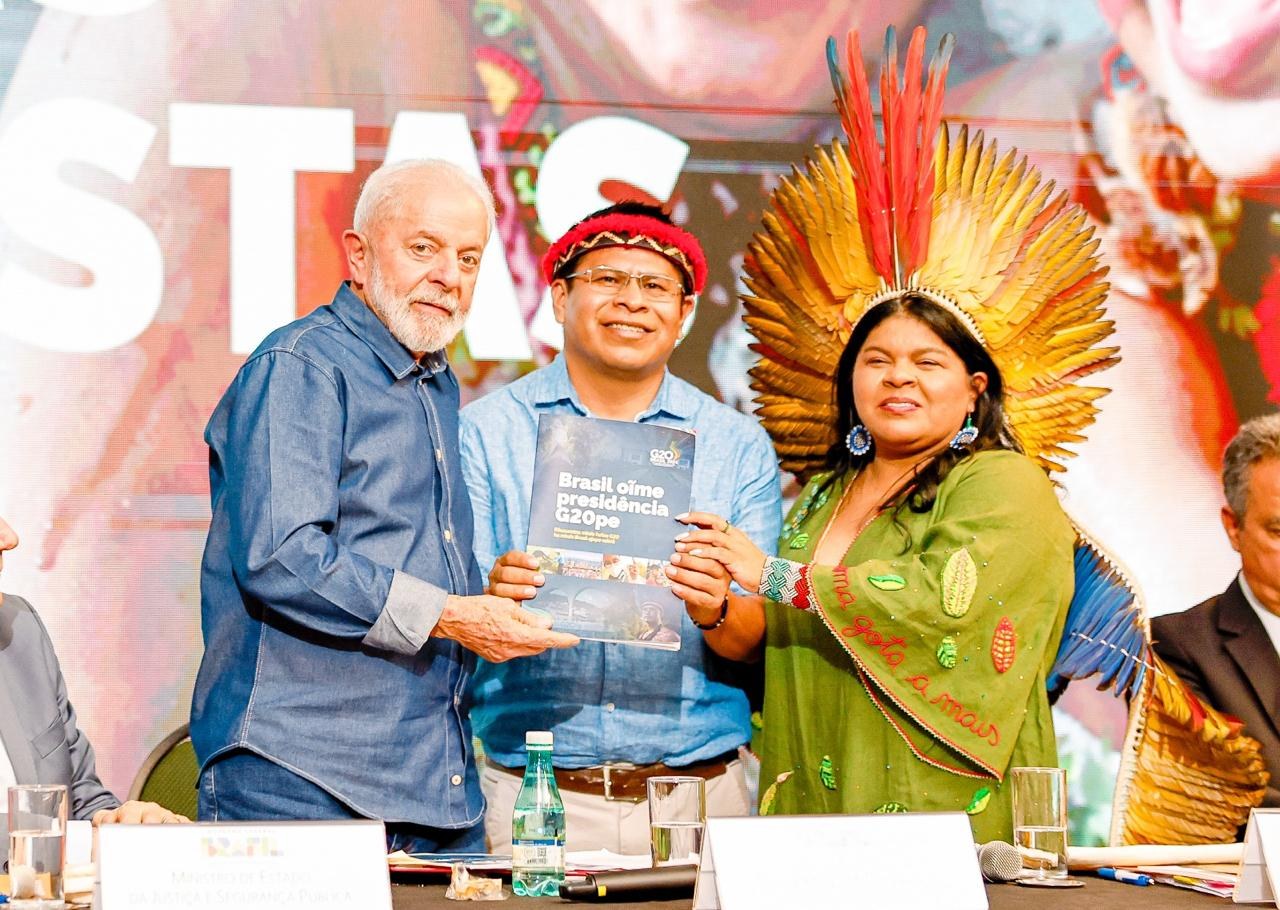The translation gives worldwide visibility to the Guarani indigenous language, currently spoken by over 26,000 people. Guarani is one of more than 100 indigenous languages in the country and is part of the Tupi linguistic family. The e-book deals with G20 issues directly impacting indigenous peoples, such as climate change, global warming, the bioeconomy, and green finance.

On Thursday (18) during the swearing-in ceremony of the indigenist advisors in Brasilia, the President of the Republic of Brasil, Luiz Inácio Lula da Silva, received a copy of the e-book Brasil na presidência do G20 - Entenda o que é o G20 e quais os responsabilidades do Brasil (Brasil in the presidency of the G20 - Understand the G20 and what Brasil's responsibilities are).
For the Minister for Indigenous Peoples, Sonia Guajajara, having a book about international politics and Brasil's presidency of the G20 in an indigenous language, Guarani, is one of the strategies to stress the importance of the Decade of Indigenous Languages. "This is how we start, showing the existence of a diversity of spoken languages. This helps strengthen the narratives and voices that are sometimes made invisible. It helps Brasil to learn more about its own reality, origin, and the perspective of the indigenous peoples," said the minister.
This was the first translation of the e-book into an indigenous language. The translation was done by Eliel Benites, a member of the Guarani-Kaiowá ethnicity who holds a PhD in Geography and is a professor at the Federal University of Grande Dourados in Mato Grosso do Sul.
He says that his motivation to engage in this work was the desire to make the Guarani language visible in Brasil and worldwide. He believes the translation into his mother tongue reinforces the importance of keeping it alive. He also highlighted the relevance of bringing content that impacts the lives of the Guarani-Kaiowá people, such as the economy, climate crises, and the environment, in the native language of his community.

Professor Benites hopes that the forum incorporates the demands of indigenous peoples in the debates and stresses the importance of the G20 agendas being understood within the indigenous context. "The indigenous peoples can contribute to the debate among the countries and, these contributions can be used to support increasingly assertive public policies, taking into account social issues that affect us, the populations who need the most attention, and consider the territorial issue," he said.
Indigenous languages are part of our national heritage. Nevertheless, they are under the threat of extinction. In 50 years, according to experts, around 20 languages are at risk of disappearing in Brasil. Faced with the imminent loss of the immense wealth of possibilities for the expression of peoples and societies, the United Nations General Assembly established the International Decade of Indigenous Languages (IDIL) for the 2022-2032 decade.
One of the priorities of Brasil's presidency of the G20 is to debate and promote the planet's sustainable development with social inclusion and respect for diversity. Indigenous and native peoples have historically been guardians of nature, forests, rivers, oceans, and biomes.
"Indigenous languages are the great code and repository of knowledge about the Amazon, the Pantanal, the Atlantic Forest, the Cerrado, the Caatinga, and the Pampas. They are ancestral languages precisely because they result from long and deep human coexistence in specific environments, producing highly specialized knowledge," says University of Brasilia professor Altaci Corrêa in an exclusive article for the G20 Brasil website.
"Indigenous languages contain inventories of species, classification systems, etiological narratives and, above all, ways of managing diversity, a fundamental technology for the preservation and biorestoration of the environment. The loss of languages implies the loss of knowledge that is decisive for tackling the contemporary climate and environmental crisis," he concluded.
In the heart of South America
The Guarani language is part of the Tupi linguistic family and is spoken by various subgroups of Guarani communities. The language is one of the most widely spoken in Brasil; according to the IBGE, there are over 26,000 Guarani speakers. It is one of the official languages of Mercosur, and a variant of the language is spoken in Paraguay by non-indigenous people.
Professor Benites explains that the Guarani communities live in the heart of South America. The villages are spread from the state of Mato Grosso do Sul to Argentina, and also in Bolivia and Paraguay. At the time of Portuguese colonization, the Guarani occupied the coastal region from São Paulo to Rio Grande do Sul, spreading across the Paraná, Uruguay, and Paraguay river basins.
The digital book translated into Guarani also has versions in Portuguese, Spanish, and English. It contains 17 pages with basic information about the G20, such as its history, how it works, member and guest countries, the priorities of the Brazilian presidency, and the working groups that make up the forum.






